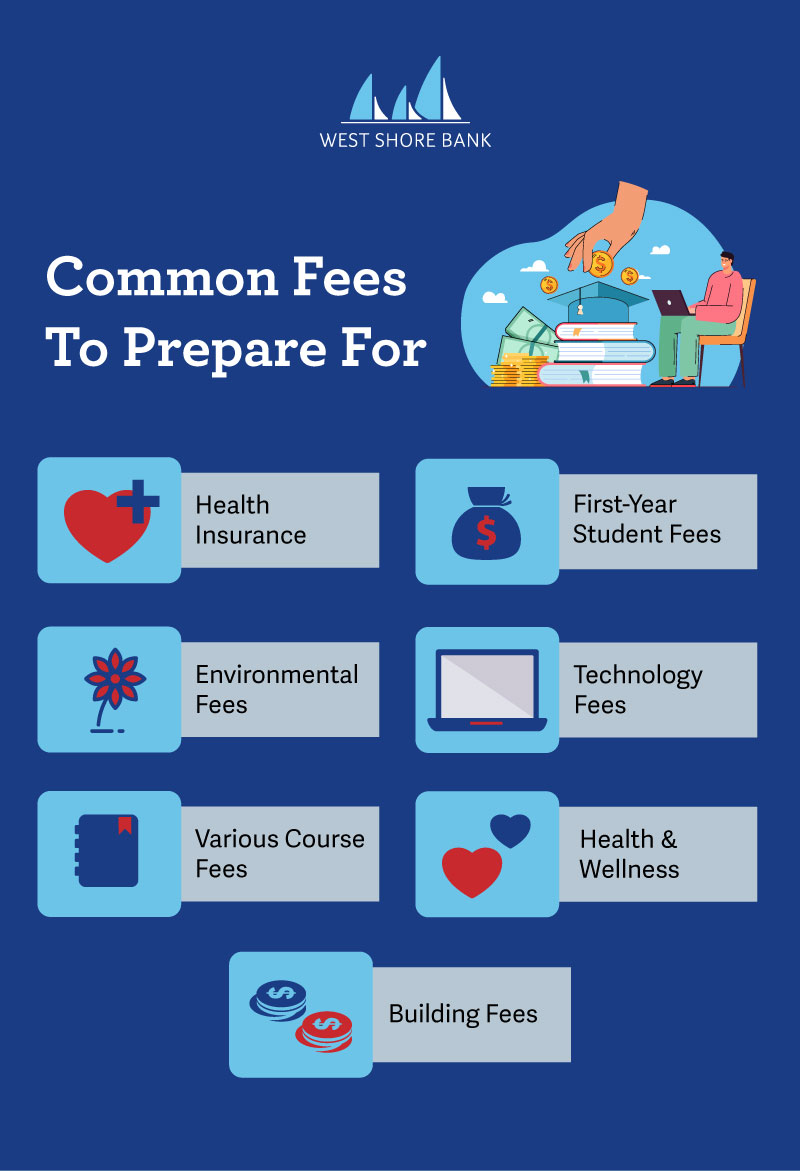Whether your child is still young or getting closer to leaving for college, every parent is looking for the best ways to pay for college. Higher education can be a ticket to a better future, but it’s also a big investment. In this article, we’ll help you understand the different costs associated with college and cover the different college funding strategies available to Michigan families.
Understanding the Costs of College
Paying for college can be one of the biggest expenses a family takes on. However, the total price is often less than published tuition rates. It’s best to estimate your net price, which is the cost of attendance minus any grants or scholarships you receive. Let’s break down the different costs of college:
Tuition
Tuition is the most significant cost of college. Tuition rates are usually charged by the year, semester, or credit. Generally, community colleges like West Shore Community College or Northwestern Michigan College will have the lowest tuition rates, followed by public universities. If you attend a public university in your home state, you’ll pay in-state tuition rates lower than the rate charged to out-of-state and international students. View a full list of state universities in Michigan here.
Private colleges and universities have the highest tuition rates, though again the total amount you pay at any school will depend on your Financial Aid package. You can apply to different schools and compare their Financial Aid offers.
It’s important to note that tuition covers the cost of classes and instruction but does not include other essential expenses such as books and supplies.
Fees
In addition to tuition, colleges charge additional fees to cover the cost of things like technology, activities, and more.

Housing and Food
If you decide to live on campus your first year, you’ll pay for housing and a meal plan. These costs can vary significantly depending on the school you choose. Commuter students can also sign up for a limited meal plan if they wish. Housing and dining costs, along with tuition, can usually be found on a college’s website.
Books and Supplies
Books and supplies are necessary for coursework and can add up quickly. Textbooks can be particularly expensive, and additional supplies may be required for specific courses or programs. To save money in this category, students can purchase used textbooks instead of new or rent instead of buy. Some course materials may also be available for free in the library.
Equipment
While universities have computer labs and other spaces where computers are available for public use, most students will want to have their own laptop. Do some research on different models and price points to find the best option for you.
Transportation
Whether commuting to a local college or traveling home during breaks, transportation costs can add up. This includes gas, public transportation, parking permits, and even flights if attending a school far from home.
Other expenses
Other potential costs for college students include personal expenses, clothing, and entertainment. These can vary widely based on individual lifestyles and choices.
How To Save For College
Parents and other family members have different account options when saving for college.
529 Plans
If your future college student is still a child, you can save for their higher education through a 529 College Savings Plan. States all have their own college savings plans, and you don’t necessarily need to choose your own state. Michigan’s 529 plan is called the Michigan Education Savings Program (MESP). It’s a tax-advantaged investment account designed to encourage saving for future education costs. There are certain restrictions on how the money in a 529 plan can be used–find more information on their website.
Personal Savings Accounts
In addition to college savings accounts, parents and other relatives can use personal savings accounts to plan for higher education expenses and transfer funds as needed during the college years. We offer the following personal savings accounts:
- Round Up for Future: A new savings program for West Shore Bank digital banking customers, in which you can make recurring transfers into any savings account or round up your everyday purchases to the nearest dollar and have the spare change go directly into your savings account.
- Statement Savings: A simple savings account that you can open for your student and save gift money and earnings in.
- Money Market: With more flexibility and access to funds, this type of savings account is great for managing expenses during the college years while still earning a competitive interest rate on savings.
- Certificates of Deposit (CDs): Commit to a certain deposit amount and term length and earn a guaranteed rate of return. You can use CDs to grow your college savings while still preserving some funds in more liquid accounts (like the West Shore Bank’s Steady Saver CD).
Scholarships and Grants
Scholarships and grants are financial aid that don’t need to be repaid. They can significantly reduce the cost of college and come in various forms:
- Scholarships: Can be merit- or need-based and range from a few hundred dollars to full tuition.
- Grants: Typically need-based and can come from federal, state, or institutional sources.
How to Find and Apply for Scholarships
There are many ways to find and apply for scholarships:
- Financial Aid Office: The financial aid office at your school can provide information on available scholarships.
- High School Counselor: High school counselors can help identify scholarships you may be eligible for.
- US Department of Labor: The Free Search Tool is a useful resource for finding scholarships.
- College Board: Use the BigFuture Scholarship Search to find the right opportunity.
- Michigan Scholarship Search: A resource for Michigan residents.
- Local Library: Your hometown library may have information on local scholarships.
- Local Foundations, Community or Religious Organizations, and Local Businesses: Many offer college scholarships to local students, including West Shore Bank, learn more about the “Making a Difference” scholarship.
- Professional Organizations: Organizations related to your field of study may offer scholarships.
- Employers or Parent’s Employers: Many companies offer scholarships to employees' children.
Types of Grants Available
- Federal Pell Grants: Need-based grants for undergraduate students.
- Service Grants: Such as the Iraq and Afghanistan Service Grant.
- Federal Supplemental Educational Opportunity Grant (FSEOG): For undergraduates with exceptional financial need.
- TEACH Grant: This is for students who plan to become teachers in high-need fields in low-income areas.
Financial Aid and Student Loans
The Free Application for Federal Student Aid (FAFSA) is crucial in securing financial aid. Students and their families must complete the FAFSA each year to be eligible for federal assistance through grants and loans. Colleges may also use the FAFSA to allocate their financial aid.
Federal vs Private Student Loans
Understand the differences between federal and private student loans:
Federal Student Loans
- The federal government sets terms and conditions.
- Fixed interest rates are often lower than private loans.
- Different repayment plans and other special benefits are available.
Private Student Loans
- Offered by banks and other lenders
- Each private student loan lender sets their terms and conditions
- May come with variable interest rates that are higher than federal loans.
Types of Student Loans
Federal Direct Subsidized Loans
These loans don’t accrue interest while you’re in school. The borrowing limit increases each year as you progress.
Federal Direct Unsubsidized Loans
These loans accrue interest from the time they are disbursed. Making interest-only payments while in school can reduce your loan balance upon graduation.
Federal Direct PLUS Loans
These loans allow parents or graduate students to borrow the total cost of college minus any financial aid received.
Private Loans
Private lenders can offer these loans with variable interest rates and terms set by the lender.
About West Shore Bank
For 125 years and counting, West Shore Bank has been making a difference in the lives of Michigan families and along the lakeshore. We are here to help you save for college with our personal savings account options. We can also set your student up with a Student Checking account to help manage funds and expenses while in school. Contact us to learn more!

